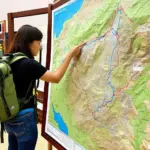Have you ever dreamt of waking up to the sound of the ocean in Bali, sipping your coffee with a view of the Eiffel Tower, or finishing your workday with a hike through the lush forests of Costa Rica? This dream doesn’t have to be a fantasy. More and more people are embracing the digital nomad lifestyle and making “work from anywhere” a reality. This guide will equip you with the knowledge and resources you need to successfully travel and work remotely.
What Does it Really Mean to Travel and Work Remotely?
Working remotely, or telecommuting, means performing your job from a location other than a traditional office. This location could be your home, a co-working space, or even a beachside cafe in Thailand! “Traveling and working remotely” takes this a step further, allowing you to combine work with exploring new places, experiencing different cultures, and embracing the freedom to move at your own pace.
Why Choose a Location Independent Lifestyle?
The allure of a location independent lifestyle is undeniable. Imagine:
- Flexibility and Freedom: Design your own schedule, work from anywhere with a good internet connection, and take breaks whenever you want.
- Travel and Exploration: Immerse yourself in new cultures, try exotic cuisines, and experience the world beyond your usual routine.
- Cost of Living: Choose to live in more affordable destinations while still earning an income from a country with a higher cost of living.
- Improved Work-Life Balance: Often, remote work allows for better integration of work and personal life. You set your own hours, allowing for more time for hobbies, family, and self-care.
Getting Started: Steps to Working Remotely & Traveling
1. Evaluate Your Situation:
- Assess Your Skills: What are you good at? Can you offer your skills as a freelancer, consultant, or remote employee?
- Financial Planning: Calculate your budget and explore ways to manage your finances while traveling. Consider freelance platforms, remote job boards, or online businesses.
2. Find Remote Work Opportunities:
- Remote Job Boards: Websites like We Work Remotely, Remote.co, and FlexJobs list remote positions across various fields.
- Freelancing Platforms: Upwork, Fiverr, and Guru connect freelancers with clients worldwide.
- Network: Let your professional network know you’re seeking remote opportunities.
3. Choose Your Destinations:
- Cost of Living: Research destinations that align with your budget. Southeast Asia, Eastern Europe, and parts of Latin America are known for their affordability.
- Visa Requirements: Ensure you can legally work from your chosen destination. Some countries offer digital nomad visas.
- Internet Reliability: A stable internet connection is essential for remote work. Check internet speeds and availability before you go.
4. Plan Your Trip:
- Accommodation: Consider the length of your stay and your budget. Options range from hostels to Airbnb to monthly apartment rentals.
- Transportation: Research local transportation options like buses, trains, or ride-sharing services.
- Travel Insurance: Protect yourself from unexpected events with comprehensive travel insurance.
5. Essential Tools and Resources for Digital Nomads:
- Laptop and Smartphone: Essential for communication, work, and research.
- VPN (Virtual Private Network): Secure your internet connection, especially when using public Wi-Fi.
- Project Management Tools: Trello, Asana, and Monday.com help you stay organized.
- Communication Tools: Slack, Zoom, and Google Meet are vital for staying connected.
Tips for Success: Thrive as a Digital Nomad
- Time Management: Establish a routine that works for you, set boundaries between work and leisure, and utilize productivity techniques.
- Communication is Key: Stay connected with clients or your team, communicate proactively, and be reliable.
- Embrace the Community: Connect with other digital nomads through online groups, coworking spaces, or local events. Sharing experiences and advice can be invaluable.
- Be Adaptable: Things don’t always go as planned. Be flexible, resourceful, and open to new experiences.
